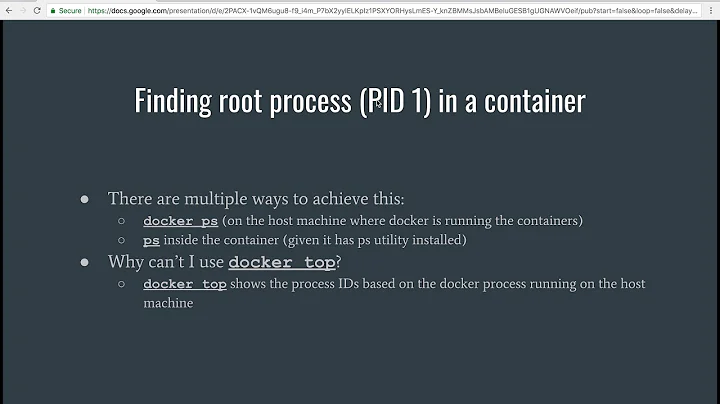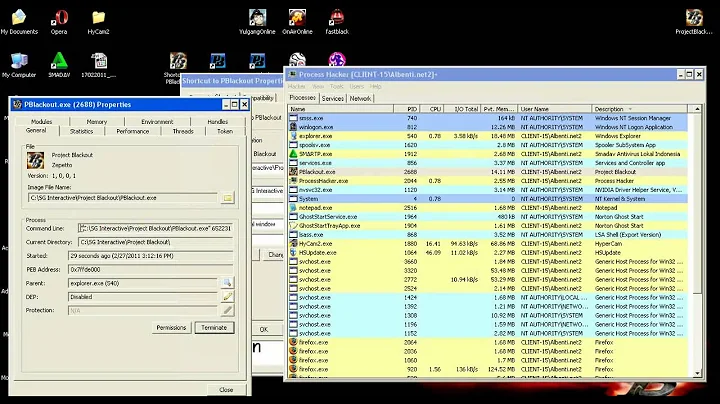How to get pid of just started process
Solution 1
What can be simpler than echo $!? As one line:
myCommand & echo $!
Solution 2
You can use sh -c and exec to get the command's PID even before it runs.
To start myCommand, so that its PID is printed before it begins to run, you can use:
sh -c 'echo $$; exec myCommand'
How it works:
This starts a new shell, prints the PID of that shell, and then uses the exec builtin to replace the shell with your command, ensuring it has the same PID. When your shell runs a command with the exec builtin, your shell is actually becoming that command, rather than the more common behavior of forking a new copy of itself, which has its own separate PID and which then becomes the command.
I find this to be much simpler than alternatives involving asynchronous execution (with &), job control, or searching with ps. Those approaches are fine, but unless you have a specific reason to use them--for example, perhaps the command is already running, in which case searching for its PID or using job control would make sense--I suggest considering this way first. (And I would certainly not consider writing a complex script or other program to achieve this).
This answer includes an example of this technique.
Parts of that command could occasionally be omitted, but not usually.
Even if the shell you're using is a Bourne-style and thus supports the exec builtin with these semantics, you generally shouldn't try to avoid using sh -c (or equivalent) to create a new, separate shell process for this purpose, because:
- Once the shell has become
myCommand, there's no shell waiting to run subsequent commands.sh -c 'echo $$; exec myCommand; foowould not be able to attempt to runfooafter replacing itself withmyCommand. Unless you're writing a script that runs this as its last command, you can't just useecho $$; exec myCommandin a shell where you are running other commands. - You cannot use a subshell for this.
(echo $$; exec myCommand)may be syntactically nicer thansh -c 'echo $$; exec myCommand', but when you run$$inside(), it gives the PID of the parent shell, not of the subshell itself. But it is the subshell's PID that will be the PID of the new command. Some shells provide their own non-portable mechanisms for finding the subshell's PID, which you could use for this. In particular, in Bash 4,(echo $BASHPID; exec myCommand)does work.
Finally, note that some shells will perform an optimization where they run a command as if by exec (i.e., they forgo forking first) when it is known that the shell will not need to do anything afterward. Some shells try to do this anytime it is the last command to be run, while others will only do it when there are no other commands before or after the command, and others will not do it at all. The effect is that if your forget to write exec and just use sh -c 'echo $$; myCommand' then it will sometimes give you the right PID on some systems with some shells. I recommend against ever relying on such behavior, and instead always including exec when that's what you need.
Solution 3
Wrap the command in a small script
#!/bin/bash
yourcommand &
echo $! >/path/to/pid.file
Solution 4
I do not know of any simpler solution, but isn't using $! good enough? You can always assign the value to some other variable if you need it later, as said by others.
As a side note, instead of piping from ps you could use pgrep or pidof.
Solution 5
use exec from a bash script after registering the pid to a file:
example:
suppose you have a script named "forever.sh" that you want to run with args p1,p2,p3
forever.sh sourcecode:
#!/bin/sh
while [ 1 -lt 2 ] ; do
logger "$0 running with parameters \"$@\""
sleep 5
done
create a reaper.sh:
#!/bin/sh
echo $$ > /var/run/$1.pid
exec "$@"
run forever.sh through reaper.sh:
./reaper.sh ./forever.sh p1 p2 p3 p4 &
forever.sh does nothing more than logging a line to syslog each 5 seconds
you now have the pid in /var/run/forever.sh.pid
cat /var/run/forever.sh.pid
5780
and forever.sh is running aok. syslog grep:
Nov 24 16:07:17 pinkpony cia: ./forever.sh running with parameters "p1 p2 p3 p4"
you can see it in the process table:
ps axuwww|grep 'forever.sh p1' |grep -v grep
root 5780 0.0 0.0 4148 624 pts/7 S 16:07 0:00 /bin/sh ./forever.sh p1 p2 p3 p4
Related videos on Youtube
rafalmag
Feel free to edit my posts if there is mistake, deadlink or anything else like that. Don't hesitate to ping me back with @rafalmag if there is something I had to put my attention on.
Updated on September 17, 2022Comments
-
rafalmag over 1 year
I want to start process (eg. myCommand) and get its pid (to allow to kill it later).
I tried ps and filter by name, but I can not distinguish process by names
myCommand ps ux | awk '/<myCommand>/ {print $2}'Because processes names are not unique.
I can run process by:
myCommand &I found that I can get this PID by:
echo $!Is there any simpler solution?
I would be happy to execute myCommand and get its PID as a result of one line command.
-
user9517 over 13 yearsOP wants to get the PID so he can kill it later. ; and && require the original process to exit before the echo $! is executed.
-
Khaled over 13 yearsYes, you are right. This will give you the pid after myCommand has terminated.
-
Chris Johnsen over 13 yearsReferencing
$!after&∨will never give you the PID of the process started for the left-hand side of the command separator.$!is only set for processes launched asynchronously (e.g. usually with&but some shells also have other methods). -
 user237419 over 13 yearsoh, and the "oneliner": /bin/sh -c 'echo $$>/tmp/my.pid && exec program args' &
user237419 over 13 yearsoh, and the "oneliner": /bin/sh -c 'echo $$>/tmp/my.pid && exec program args' & -
Chris Johnsen over 13 yearsTo properly preserve internal whitespace in the arguments, you should use
exec "$@"instead ofexec $*. Technically what you need to preserve is not whitespace but occurrences of the characters in the IFS shell parameter (which defaults to space, tab, and newline). -
 user237419 over 13 yearspoint taken. :)
user237419 over 13 yearspoint taken. :) -
rafalmag over 13 yearsThank you merging these commands with "&" helped me a lot.
-
rafalmag over 13 yearsThank you, I did not know $$ parameter. It can be very useful.
-
Ben A. Hilleli about 10 yearsin a bash script, in a loop which starts programs, $! is not accurate. Sometimes it returns pid of the script itself, sometimes of grep or awk run from the script any solution to specifically get the pid of the process just launched in this scenario? something like pid=
myprogramwould have been awesome -
Giraffe about 9 yearsNB that this requires you to start the command using a
&as the previous line, otherwise the echo basically returns blank. -
 Shashank Vivek almost 8 yearsassigning to variable like
Shashank Vivek almost 8 yearsassigning to variable likecommand & echo $!freezes the execution at this step :( -
temple over 7 yearsit is helpful, and why no one vote up excep me? good job though :)
-
user5359531 almost 6 yearsBefore I can run
myCommand, I need to set a number of environment variables in my bash script. Will these carry over to the environment in which theexeccommand is running? -
user5359531 almost 6 yearsLooks like my environment does carry over into the
execcommand. However, this approach does not work whenmyCommandstarts other processes, which are the ones you need to work with; when I issue akill -INT <pid>wherepidwas obtained this way, the signal does not reach the sub-processes started bymyCommand, whereas if I runmyCommandin the current session and Ctrl+C, the signals propagate correctly. -
crobar over 5 yearsI tried this, but the pid of the myCommand process seems to be the pid output by echo $$ +1. Am I doing something wrong?
-
Tfb9 over 5 yearsHow can I record the PID number returned by this code in a bash variable? For a reason unclear to me,
stdoutdoes not seem to be recorded in this example:RESULT="$(./start_and_get_pid.out echo yo)"; echo "$RESULT" -
tonysdg over 5 years@Tfb9: I'd honestly recommend one of the other approaches; I wrote this 2+ years ago and it's by far one of the hackier/error-prone methods presented (or so I think).
-
Tfb9 over 5 yearsThanks for the note. I think I solved my problem with this
sleep 10 & PID_IS=$!; echo $PID_IS -
Michael about 4 yearsThis doesn't work if you don't explicitly background the process! For instance, your process may background itself after it has done something you need to wait for before continuing.
-
Michael about 4 yearsThis is brilliant, but it's not working for me when I try to get the echoed value into a variable so I can actually use it later to kill the process, e.g.
PID=$(sh -c 'echo $$; exec myCommand')just hangs, whereas if I remove thePID=$(...)wrapper it displays the PID and continues immediately! -
 S.Goswami over 3 yearsIn ruby, $$ prints the PID. So the ruby pid should match what's printed by echo
S.Goswami over 3 yearsIn ruby, $$ prints the PID. So the ruby pid should match what's printed by echoruby -e "p($$) && sleep(3)" & echo $!, but Ruby pid is completely different from whatecho $!says. But the answer below, which translates tosh -c 'echo $$ ; exec ruby -e "p($$) && sleep(3)"'works!




